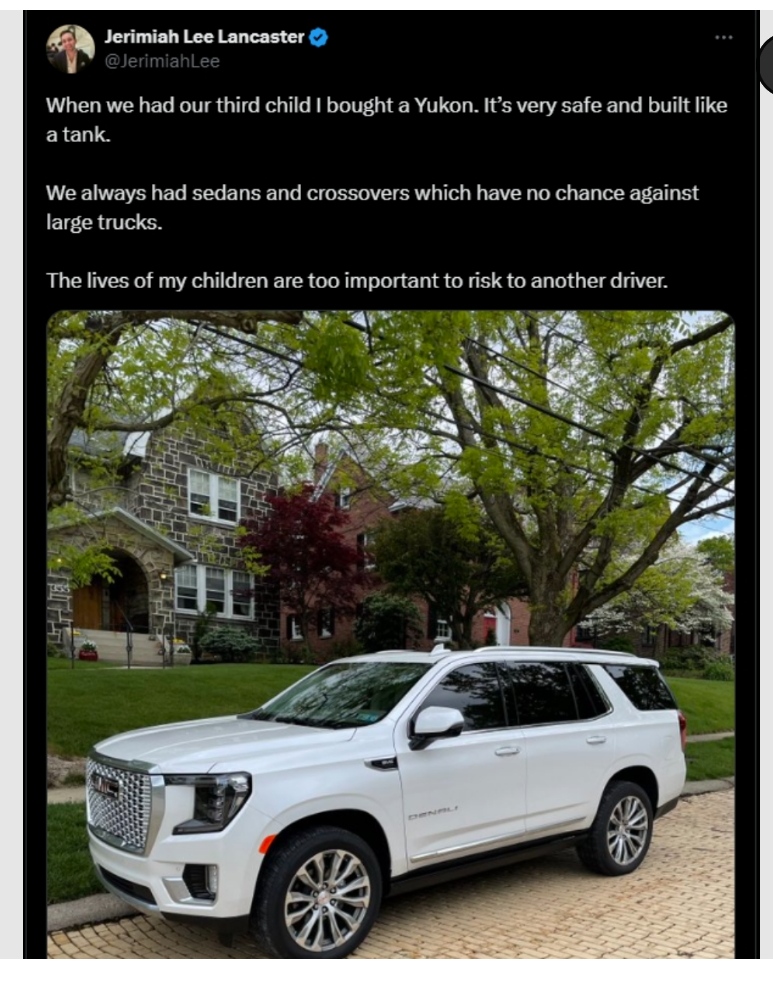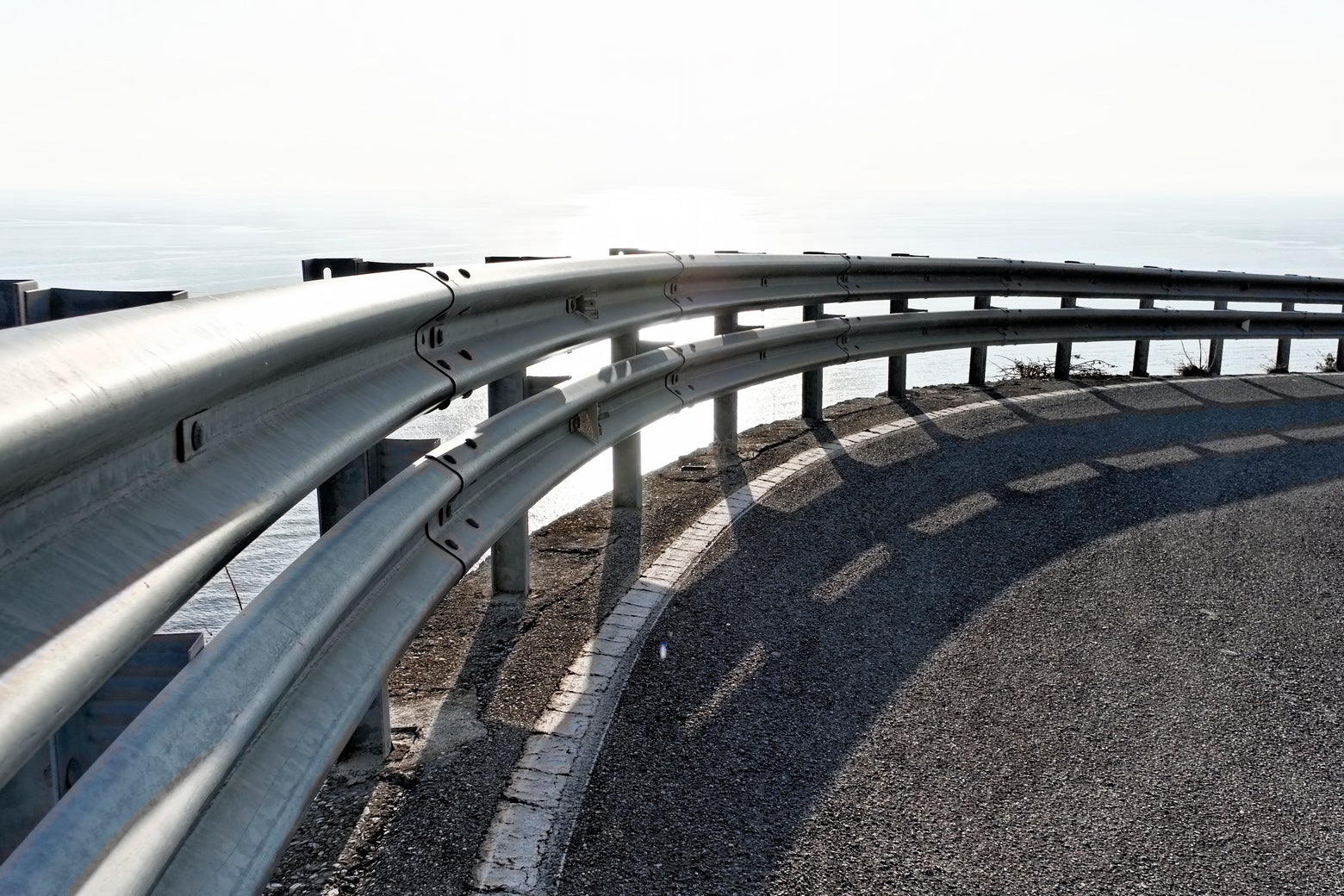There was a discussion a couple of years ago around gasoline taxes and how they are supposed to pay for roadway maintenance. The question came up about EVs. There were discussions about how to include EVs in the taxation system so they would pay for their fair share of the road. One of the options was to impose a tax attached to your vehicle registration based upon the weight of the vehicle. The greater the weight, the more wear and tear it produces on the road surface. This might be one solution to the barrier problem, namely moving the extra cost to the reason for the extra cost.
deleted by creator
I think you make want to go the other way. Making tires more expensive wont make people choose smaller cars, they will choose worse tires. And then they will crash into you because they cant stop.
It’s a good rule not to make essential safety items more expensive. Because consumers in general will always choose a cheaper, less safe option.
They’ll still have to replace them more often or won’t be able to drive their vehicles or pass a state inspection to get their annual registration completed unless their car is road-worthy, thus costing them more money in tickets and remedies of said ticket.
Sure, but the problem is that you dont want to make safety equipment more expensive, as it encourages cheaping out and cutting corners. People already buy cheap and nasty tires that dont grip well or stop well (but still meet roadworthiness), its best to avoid further encouraging that.
There is no reason not to just directly tax against the weight of the car, as defined by the manufacturer. There already is a yearly rego payments, just scale that directly against weight.
A direct tax is also clear and obvious. If someone has a large car, the rego weight tax will clearly show they are paying more. Making tires more expensive just gets rolled into the price of the tire, which are already moderately expensive, so its easier to just rationalise it and ignore it.
There was a discussion a couple of years ago around gasoline taxes and how they are supposed to pay for roadway maintenance.
I just want to point out, even if they’re supposed to, gas taxes do not pay for roadway maintenance, not by a long shot
ah yes, another anti-environment tax. More barriers to fossil-fuel free adoption. As you would expect, Mississippi already has this tax. Don’t be like Mississippi.
Wouldn’t be anti-environmental… it would be for all vehicles including ICE and commercial, as well.
And the heavy vehicles get classified as light cargo so are largely exempt from those taxes. They’re promoting and building heavy “cargo” vehicles specifically because they get exemptions for fuel efficiency and taxes (depending on location).
Some states do exactly that, or did back in the day. 30-years ago in Oklahoma, an old 2-ton dump truck with an antique plate was $20, a new Corvette $600. I think Texas flipped that and charged by weight vs. value.
A more logical way would be to tax a car based on how many km/miles it travels in a year, at least partially.
I bet that my 1.5 tons car travelling 10.000 Km/year ruins the street a lot less than my neighbor’s 1 tons car that travel 30.000 Km/year
Every mile an EV drives is already taxed as we already tax electricity consumption. There is no reason to add a tax for something already taxed.
That is true also for fossil-fuel
That’s 3175 kg for non-free folk. My car has around 1600 kg. 7k pound car is a fat fat cow.
I prefer the term wildling.
It’s the battery, and the support frame to carry the weight of the battery safely. Like it or not - cars are getting heavier.
Just get an even bigger car, it will keep you safe from those.
Canyonero!
Your comment reminds me of this:

Context:

That’s why I get everywhere by bus.
7000 Pounds is 3.2 Tons (metric)
3.2 Tons
geez, i wonder why these guardrails wouldn’t work on a fucking Truck
This becomes a self-reinforcing cycle. If there are 7000lb passenger trucks on the highway around my compact car, I maybe start wanting to get a larger vehicle myself to protect myself from the idiots who drive them.
There has to be some sort of incentive either for smaller cars or against larger cars. Currently you can go into a dealer, tell them you want the biggest baddest truck/SUV that they have, and buy it all while having a normal license.
You’d only be paying a slight premium on whatever road or fuel tax if that while having the benefit of not getting destroyed in a car accident. As it stands, there is little reason to buy a larger vehicle unless you actually don’t like driving a car that big.
Sort of.
It’s either giant trucks, or Subarus.
My first car had a curb weight of 2400 lbs. It’s absurd how fucking huge these planet-destroying, environment destroying, life destroying monstrosities have become.
Oooohh yeeeaaaahhhh!!!
Natural selection
Sounds like A Nice Morning Drive. As noted in the archived page above, that story inspired the song Red Barchetta by the band Rush.

that thumbnail photo looks a lot like the guardrail on lifeguard road La Jolla farms Blacks Beach overlook switchback trail
Aka “Deadman’s Curve”.
If you want society to rely less on cars stop subsidizing roads.
Yeah! Everyone should have to pay full price for their roads or build their own!
bruh
Apparently the author (and some of you as well) haven’t heard about 80,000lb tractor trailers…
You mean those commercial vehicles that need a different licence?
…and yet I don’t feel even a bit sad. What could this mean ?
You’re a psychopath?
What a load of shit. Pretty sure roads are already used by many vehicles of Greater mass than 7000lbs. Trucks. Buses. Coaches.
18 wheelers and other heavy vehicles are definitely not going to be stopped by a guardrail. They also disintegrate any small passenger vehicle they come in contact with at any significant speed. I’m not sure how pointing out that they are dangerous is a load of shit.
Additionally, heavy vehicles cause upwards of 80% of road wear, which means we are subsidizing private transport companies by not forcing them to fund a proportional amount of road maintenance.
Additionally, heavy vehicles cause upwards of 80% of road wear, which means we are subsidizing private transport companies by not forcing them to fund a proportional amount of road maintenance.
They do. There are additional fee’s and fuel surcharges that states make transport companies pay for road upkeep.
They pay more but not 80% of the total cost of maintenance. That’s what the distribution would need to be in order to cancel out the outsized influence they have on infrastructure degradation.
The article is focused on passenger cars becoming heavier, no?
Yes, but you brought up other heavy vehicles not me.
But not with nearly every vehicle being one of them and operated by people with CDLs that understand a lot of the safety features of the road aren’t going to work for them.
Mentions skidding on ice in first paragraph. No amount of training can reverse the laws of friction.
Thing is, I agree and think normal consumer passenger cars are getting far too heavy. Like people.












